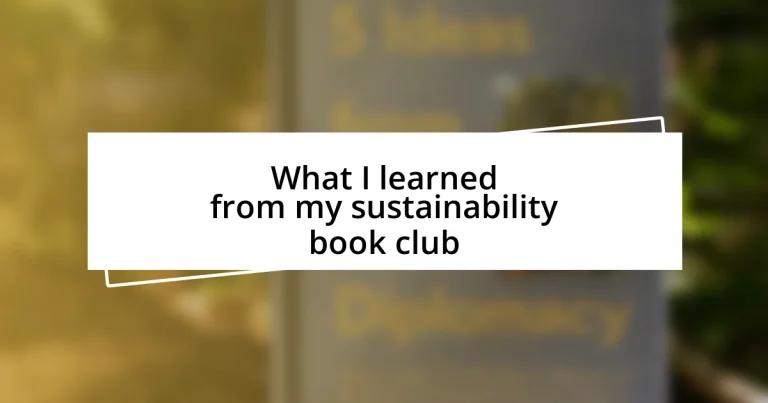Key takeaways:
- Participants shared personal stories and reflections on sustainability, fostering a sense of community and empowering collective action.
- Key themes discussed included waste reduction, the impact of consumer choices, and the importance of awareness and education in promoting sustainability.
- Challenges faced in sustainability efforts included economic barriers, emotional strain, and the difficulty of changing ingrained habits, emphasizing the need for supportive communities.
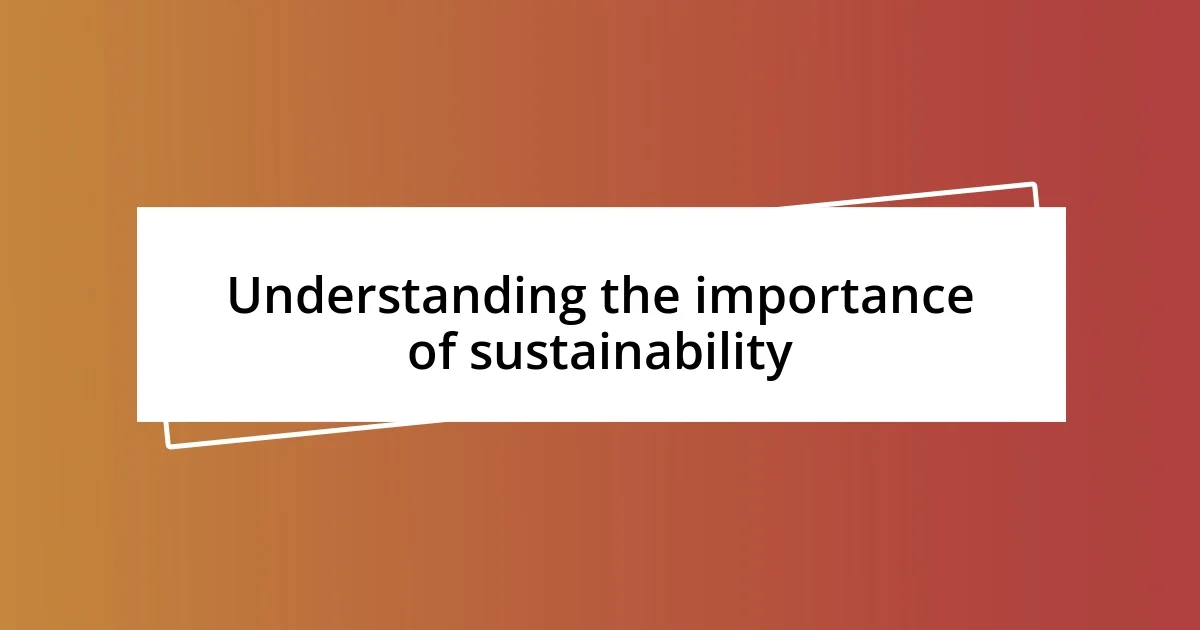
Understanding the importance of sustainability
Sustainability is not just a buzzword; it’s a vital practice that affects our environment, economy, and future generations. I remember a recent discussion in my book club where one member shared how switching to reusable bags not only reduced waste but also inspired her community to take similar actions. Isn’t it fascinating how small changes can have a ripple effect?
As we delved into the principles of sustainability, I often found myself pondering my own daily choices. Do I really need that plastic bottle when there’s a perfectly good reusable one at home? This kind of self-reflection not only fosters a deeper understanding of sustainability but also highlights the interconnectedness of our actions and their impact on the planet.
Feeling part of a larger movement towards sustainability can be incredibly empowering. I recall the emotional charge in the room when we shared our personal stories about witnessing pollution’s effects in our neighborhoods. It made me realize that sustainability isn’t just about the environment; it’s about our communities, our health, and leaving a legacy we can all be proud of. How can we afford to ignore that?
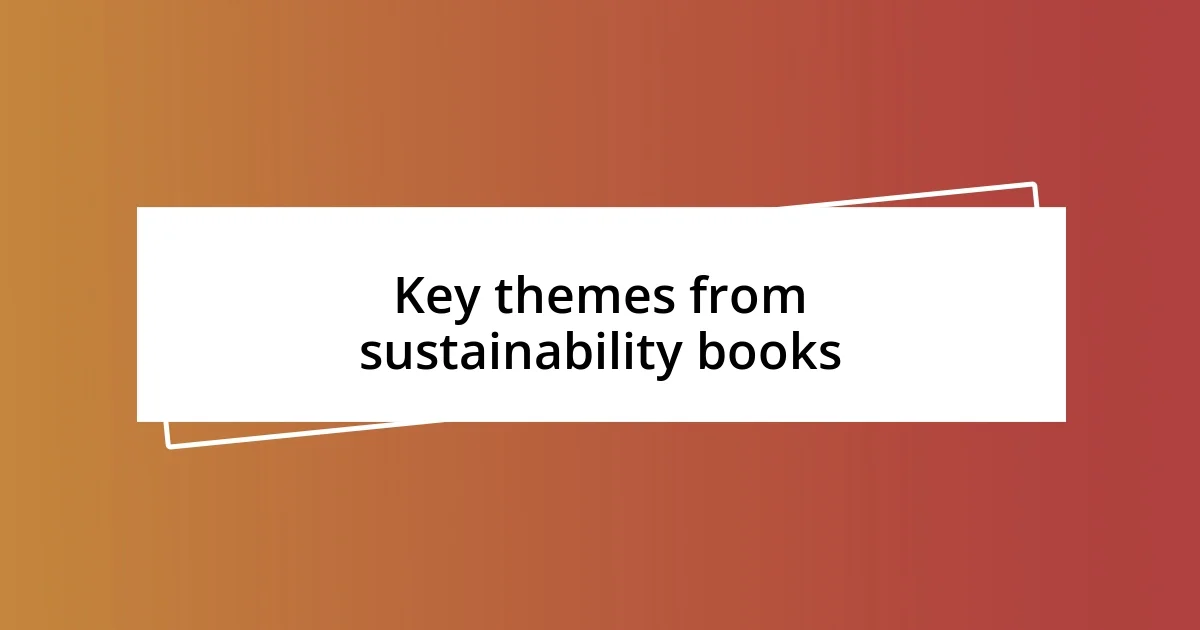
Key themes from sustainability books
Sustainability books often emphasize the theme of waste reduction and its significance in the broader context of environmental health. One memorable discussion in my book club revolved around a book that detailed the concept of “zero waste living.” I vividly remember sharing how my attempts to compost kitchen scraps led to less garbage and a surprising connection to the soil that nurtures our food. This theme resonated with everyone, as it highlighted not just the need for change, but the tangible benefits that come from mindful living.
Another key theme is the impact of consumer choices on sustainability. I once recounted my experience of switching to local, seasonal produce. The trip to the farmer’s market became more than just grocery shopping; it transformed into a delightful ritual, connecting me with local growers and enhancing my appreciation for food. This theme encouraged my book club mates to consider how their buying habits ripple through their communities, affecting local economies and the environment alike.
A common thread we often explored is the importance of awareness and education in driving sustainable practices. I was particularly moved during a session when we discussed a book about indigenous practices. It opened my eyes to how traditional knowledge can guide modern sustainability efforts. Realizing that there’s so much we can learn from diverse cultures sparked inspirational discussions about integrating these practices into our own lives. This emphasizes how awareness can empower us to make informed choices that benefit both the planet and ourselves.
| Key Theme | Personal Insight |
|---|---|
| Waste Reduction | Composting led to less garbage and a deeper connection to the soil. |
| Consumer Choices | Switching to local produce transformed my grocery shopping into a meaningful ritual. |
| Aware and Educate | Learning from indigenous practices inspired discussions about integrating traditional knowledge. |

Insights gained from book discussions
The insights gained from our book discussions consistently surprise me. I recall one session where we dove into a book detailing the consequences of our fast fashion habits. It was eye-opening to see how our clothing choices can contribute to environmental degradation, especially when one member candidly shared her journey to thrift shopping. Hearing her excitement about uncovering unique pieces reminded me that embracing a more sustainable wardrobe doesn’t have to feel like a sacrifice; it can actually be fun and fulfilling.
Here are some insights I found particularly enlightening:
- Emotional Connection: Discussing the environmental impact of our purchases stirred a passion in our group, prompting us to seek more eco-friendly options.
- Courage to Change: Several members bravely shared their challenges with making sustainable choices, which fostered a supportive atmosphere for growth and change.
- Community Impact: We explored how, by reducing our consumption, we collectively improve our community’s overall environmental footprint, making our conversations feel like collective action.
- Broader Perspective: Engaging with different viewpoints during discussions opened my eyes to aspects of sustainability I had yet to consider, from social justice to biodiversity conservation.
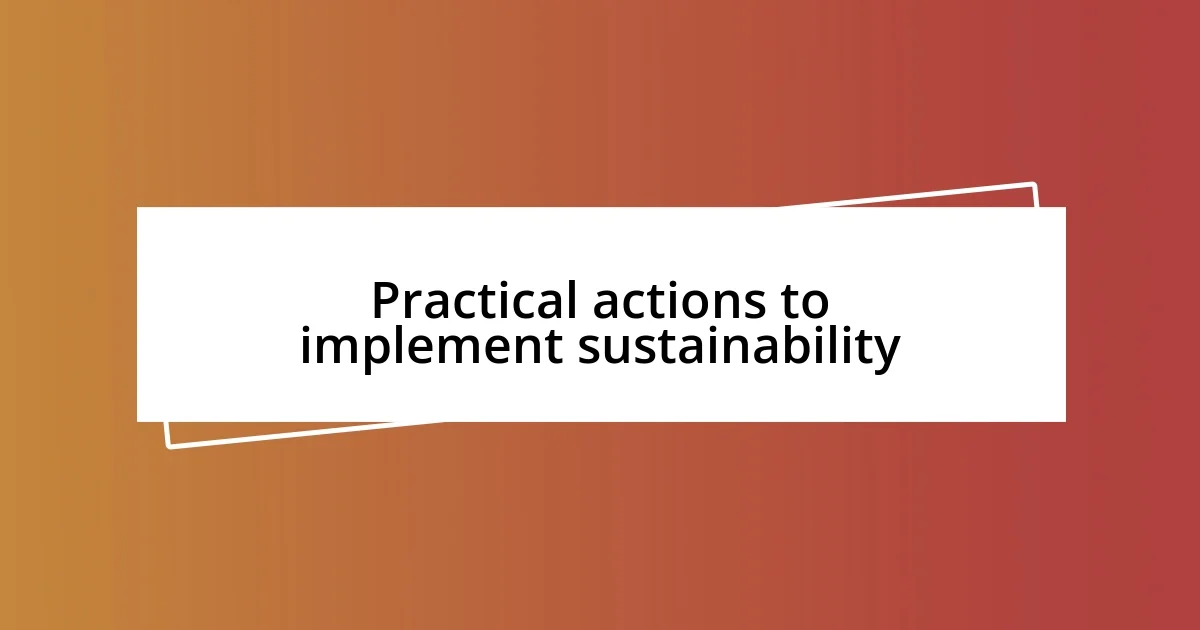
Practical actions to implement sustainability
Taking practical steps toward sustainability doesn’t have to be overwhelming; even small actions can create significant change. For instance, I made a concerted effort to eliminate single-use plastics from my life. I still remember how proud I felt carrying my canvas bags to the grocery store instead of using those flimsy plastic ones. Not only did it reduce waste, but it sparked conversations with friends about their choices too. Have you ever noticed how one small action can ripple through your circle of influence?
I discovered that reducing meat consumption can be a game-changer for both health and the planet. A few weeks after my book club discussed plant-based diets, I decided to experiment with “Meatless Mondays.” This simple shift made my meals more colorful and inspired me to try new recipes. I can’t tell you how much joy I found in creating a delicious quinoa salad bursting with seasonal vegetables. It felt empowering to support sustainable food systems while enjoying my meals. What’s stopping you from trying something new in your kitchen?
Another impactful action I embraced revolves around energy conservation. After reading about the benefits of switching to LED light bulbs, I made the change in my home. The immediate energy savings were great, but I was even more surprised by how much cozier the soft light felt. It led me to reflect on how our everyday choices not only contribute to sustainability but also enhance our living spaces. Isn’t it fascinating how implementing sustainability can make our homes more inviting and warm?
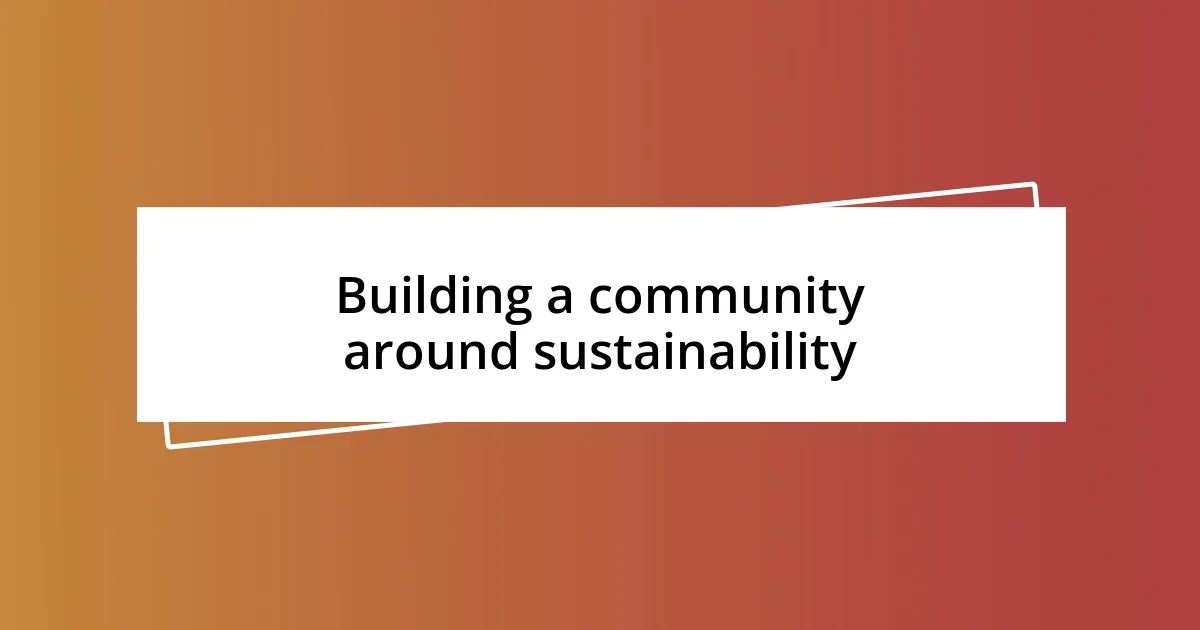
Building a community around sustainability
Building a community around sustainability can be incredibly rewarding. When I first joined the book club, I was amazed at how quickly a sense of trust and camaraderie developed. One evening, a member shared how her family started a community garden. It not only provided fresh produce but also bridged connections with neighbors. Isn’t it powerful how shared goals can unite us within our locality?
What truly struck me was the diversity of backgrounds in our group. Each person’s unique experiences shaped our conversations and expanded my understanding of sustainability. One session, a retired teacher discussed the importance of environmental education for children. Hearing her passion ignited in me a desire to mentor local youth. How can we inspire the next generation if we don’t actively engage them in these discussions?
I’ve noticed that our gatherings can feel like a mini-activism hub. After discussing books on climate rights, we organized a small rally to raise awareness about local environmental issues. I had never participated in something like that before, but the energy in the group was contagious, and it made me realize how a community focused on sustainability can empower us all. When we come together, it makes the fight for our planet feel less daunting, right?
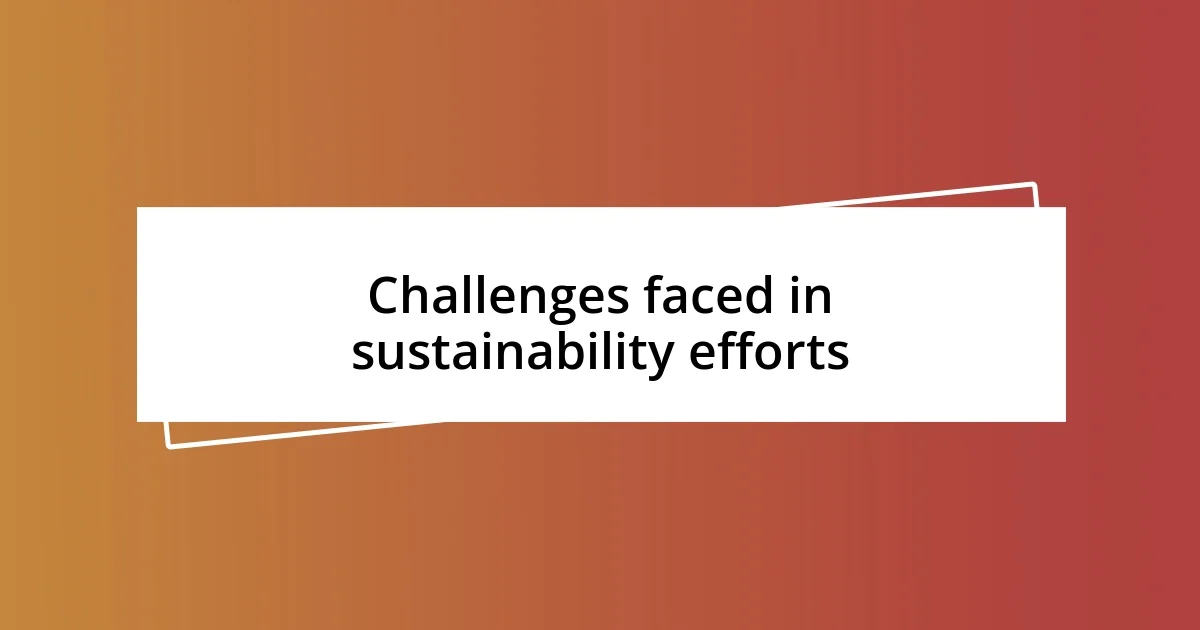
Challenges faced in sustainability efforts
Facing challenges in sustainability efforts often feels like navigating a complex labyrinth. For instance, during our book club discussions, one member revealed her struggle with convincing her workplace to adopt greener practices. She felt like a lone voice in a crowded room, which reminded me how sometimes, it’s challenging to shift ingrained habits and mindsets. Have you ever experienced this kind of frustration when trying to bring about change in your environment?
Another hurdle that resonated with me was the economic aspect of sustainable choices. While I’ve embraced eco-friendly products, I’ve also noticed that they sometimes come with a hefty price tag. I remember standing in the aisle of my local grocery store, torn between a more expensive organic option and the conventional choice. It’s disheartening to realize that sustainability can feel like a luxury item, and it leaves me wondering: How can we make sustainable living more accessible for everyone?
Moreover, we often overlook the emotional strain involved in sustainability advocacy. After one particularly intense meeting about climate change impacts, I felt a heavy weight on my shoulders. I found myself questioning not just our ability to create change, but also my role in it. This made me wonder: How can we balance our passion for advocacy with our mental well-being? In sharing our vulnerabilities, my book club members helped each other find a sense of hope amidst the challenges, emphasizing the importance of community in our sustainability journeys.












